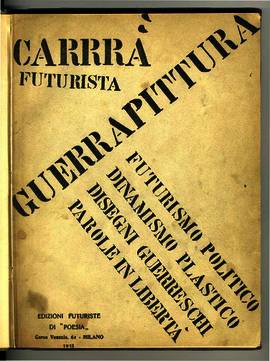
War

- C. Carrà: Guerrapittura, cover, 1915.
"Non v’è più bellezza, se non nella lotta. Nessuna opera che non abbia un carattere aggressivo può essere un capolavoro. La poesia deve essere concepita come un violento assalto contro le forze ignote, per ridurle a prostrarsi davanti all’uomo. […]
Noi vogliamo glorificare la guerra – sola igiene del mondo – il militarismo, il patriottismo, il gesto distruttore dei libertari, le belle idee per cui si muore e il disprezzo della donna."
F. T. Marinetti, Fondazione e manifesto del futurismo (in “Le Figaro”, Parigi, 20. February 1909)
"Noi futuristi che da più anni glorifichiamo tra i fischi dei Podagrosi e dei Paralitici, l’amore del pericolo e della violenza, il patriottismo e la guerra, sola igiene del mondo, siamo felici di vivere, finalmente questa grande ora futurista d’Italia, mentre agonizza l’immonda genia dei pacifisti…"
F. T. Marinetti, Secondo manifesto politico, 11. October 1911
In the first edition of “L’Italia Futurista” Emilio Settimelli, one of the directors of the new Florentine periodical first published in 1916, turns to his readers by writing the following: “Sul principio della nostra guerra si è creduto che il più sacro, anzi l’unico dovere di tutti fosse quello di sospendere ogni lavoro non direttamente consacrato ad essa.” However, this was, as Settimelli writes, just a “first impulse”, as not all Italians were at the front and they should consequently feel obliged to keep on working on cultural and intellectual fields. The establishment of a periodical like “L’Italia Futurista” should conduce to spread futurist innovations, as well as news from the front. The war is in fact an important aspect which runs all the way through the pages of “L’Italia Futurista” in the form of articles, manifestoes, and also in parole in libertà.
The thematic portal of WAR of PRO FIRENZE FUTURISTA offers the possibility to search for these contributions. Beyond this, selected relevant material will be disposable for a simplified consultation. Books like “Guerra sola igiene del mondo” and further provocative texts form the worldwide image of futurism. The futurists regard war as a possibility to drastically renew circumstances and to overcome the “passatism”, which was considered absolutely necessary in Italy. In their manifesto of establishment they kept on postulating that “the only beauty left was in battle”. Surely Balla and Marinetti were not the only ones to consider the war a way to consolidate their nation and to create a deeper political unity of Italy (Lista 2010). The Italian futurism came up only a few years before the First World War broke out and many of its combatants also went through the turmoil of the Second World War. Even this fact indicates the important role of this topic among the futurist movement. At the same time, the attempt of formulating a general statement on the futurist’s relation to war involves a danger of simplification. Numerous experts dealt with the complexity of this problem and so also Enrico Crispolti, for instance, considers war one of the “major topics of futurism”. In regard of the much-discussed nearness of the futurism to the fascist movement, nowadays the assumption of a “rehabilitation of futurism” (Eimert 1974) sometimes comes up; but even in 2010, Giovanni Lista criticised the repeated attempt of the Italian rightists to exploit the futurist movement for own propaganda purposes. In Germany, however, the image of futurism as a “fascist movement” still seems to dominate – sensitisation and further clarification would be a concern of Pro Firenze Futurista.
A gradual extension of the thematic portal WAR and the addition of further material are being prepared.
Cited Literature:
Crispolti, Enrico (ed.): Futurismo. I grandi temi. Consorzio Palazoo Ducale, Genova. Milan 1997.
Eimert, Dorothea: Der Einfluß des Futurismus auf die deutsche Malerei. Cologne 1974.




